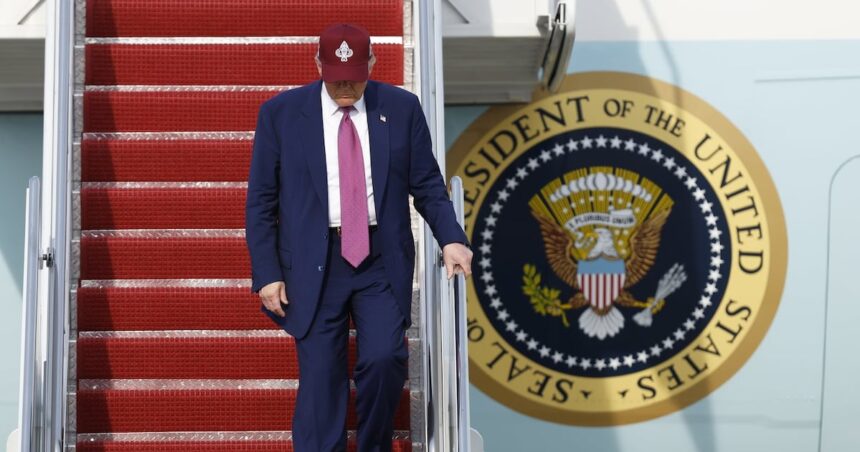I’ve just spent three hours in a cramped D.C. courtroom watching America’s trade policy collide with its judicial system. The federal appeals court’s decision yesterday to allow the Trump administration to continue collecting billions in tariffs while legal challenges proceed represents more than just a procedural victory for the White House – it’s a pivotal moment in the ongoing redefinition of executive power over global commerce.
“This ruling effectively gives the administration a green light to continue its tariff regime while the underlying legal questions remain unresolved,” explains Jennifer Hillman, former member of the WTO Appellate Body and current senior fellow at the Council on Foreign Relations. “The economic impacts will continue to accumulate during what could be a lengthy appeals process.”
The three-judge panel from the U.S. Court of Appeals for the Federal Circuit determined that halting tariff collection would cause “irreparable harm” to the government’s trade policy objectives, overruling a lower court’s temporary injunction. For the business plaintiffs who’ve paid millions in import duties since 2018, the decision means continued financial pressure with limited recourse.
I spoke with Marcus Williams, CEO of a medium-sized electronics manufacturer in Pennsylvania, as he exited the courthouse. “We’ve already paid over $2.3 million in tariffs on components we simply can’t source domestically,” Williams told me, his frustration evident. “That’s money we can’t invest in hiring or expanding. And now we’re told to keep paying while the courts figure this out?”
The legal battle centers on Section 232 of the Trade Expansion Act and Section 301 of the Trade Act – provisions the administration has leveraged to impose tariffs on steel, aluminum, and various Chinese goods. Critics argue these actions stretch the statutes beyond their intended purposes, particularly regarding national security justifications.
What makes this case particularly significant is the judiciary’s reluctance to intervene in trade policy implementation. The appeals court emphasized traditional deference to executive authority in international commerce, even as plaintiffs presented evidence of economic harm to American businesses and consumers.
Data from the Federal Reserve Bank of New York estimates that the tariffs have cost American households an average of $831 annually. The Peterson Institute for International Economics calculates that import taxes have reduced U.S. real income by approximately $1.4 billion monthly.
Standing outside the Treasury Department this morning, I watched trucks unload shipping containers from Baltimore’s port – goods that will generate millions in tariff revenue today alone. The Customs and Border Protection agency has collected over $73 billion in Section 301 tariffs since their implementation, according to recent Treasury figures.
The court battle reflects America’s broader struggle to define its economic relationship with China and other global partners. While the administration frames tariffs as necessary leverage in addressing trade imbalances and intellectual property concerns, opponents see them as counterproductive taxes that disrupt supply chains and increase consumer costs.
“What we’re witnessing is an unprecedented expansion of executive authority over trade that will likely outlast this administration,” says Caroline Burton, trade policy director at the Brookings Institution. “The courts have historically given presidents wide latitude on trade, but these tariffs push those boundaries in ways that could permanently alter the separation of powers.”
For communities across America, the impacts vary dramatically. In steel-producing regions of Pennsylvania and Ohio, some manufacturers have expanded operations under tariff protection. Meanwhile, in agricultural states like Iowa and Nebraska, retaliatory measures from China have suppressed commodity prices and export opportunities.
While visiting a steel plant in Bethlehem last month, I met workers who credited tariffs with revitalizing their industry. “Three years ago, we were on skeleton crews,” plant manager Robert Diaz told me. “Now we’re running three shifts and hiring.” Just fifty miles away, a furniture importer was laying off staff, unable to absorb rising costs of metal components.
The judicial system now faces complex questions about executive authority, economic evidence, and statutory interpretation. The Supreme Court may ultimately decide whether these tariffs represent legitimate policy tools or executive overreach – a decision with implications stretching far beyond trade.
As Washington awaits further legal developments, the global trading system continues adjusting to America’s more confrontational stance. European and Asian diplomats I’ve spoken with express concern that prolonged tariff disputes will further fragment international commerce into competing blocs with divergent rules and standards.
For now, importers must continue paying duties while pursuing their case through a judicial process that could extend well into next year. The administration, meanwhile, has gained valuable time to advance its broader economic agenda without judicial interference.
Standing at the intersection of law, economics, and global politics, this case exemplifies how America’s institutions are struggling to balance traditional principles with new commercial realities. Whatever the final legal outcome, the implications for executive power and international trade relations will reverberate long after today’s tariffs are collected.






